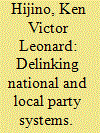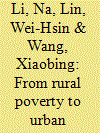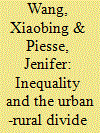| Srl | Item |
| 1 |
ID:
120590


|
|
|
|
|
| Publication |
2013.
|
| Summary/Abstract |
Broader structural developments in Japan in the past two decades-decline of clientelist practices, partisan de-alignment, and decentralization-have dissolved traditionally close ties between national and local party systems, creating an environment conducive to the emergence of local parties. In this context, popular chief executives in four regions launched new parties. I trace how these parties emerged and how national parties reacted to them, from the appearance of the new-party leaders to the 2011 local elections. In comparing the four cases, two factors appear to shape their trajectories: the urbanness of their electoral environments and the responses of the two national parties at the local and the national level. In dealing with the new challengers, both the Liberal Democratic Party and Democratic Party of Japan experienced considerable intraparty conflict and defections, indicating a process of delinking between national and local party systems.
|
|
|
|
|
|
|
|
|
|
|
|
|
|
|
|
| 2 |
ID:
113843


|
|
|
|
|
| Publication |
2012.
|
| Summary/Abstract |
China's impressive growth has been accompanied by huge rural-urban divide and social sacrifice of many including rural-urban migrants. Reflecting on the documentary Last Train Home (2009) by Lixin Fan, this paper identifies and examines the life of rural-urban migrants in China in terms of poverty-reduction, child-care, education and equal opportunities for a better life. By comparing the seemingly difficult and tragic life of the Zhang family against statistical facts, it shows that their suffering and struggles are common to most migrants. In essence, by creating an interactive dialogue between the film and the economic reality in China, this paper highlights the severe constraints on the Chinese peasantry and discusses the implications of limited choices and social injustice towards rural-urban migrants. It argues that the inequality in opportunities and the lack of social care for migrants has created huge social cleavage that not only reduces social welfare but may also impede further development.
|
|
|
|
|
|
|
|
|
|
|
|
|
|
|
|
| 3 |
ID:
099909


|
|
|
|
|
| Publication |
2010.
|
| Summary/Abstract |
Using three comparable national representative household surveys for China in 1988, 1995 and 2002, the present paper reveals the regressivity and urban bias of China's direct tax and welfare system in this period. It shows that a regressive taxation system and skewed allocation of subsidies increases the urban-rural income gap and enhances overall inequality. Modeling these relationships indicates that the relatively poorer rural population has a net tax liability, whereas those in the richer urban areas receive net subsidies. This pattern is common in China, although the extent of the bias varies. This skewed system of tax and welfare payments is a major cause of the persisting urban-rural income gap and contributes to the overall income inequality in China. The abolishment of the agriculture tax in 2006 has had a positive impact on rural people's livelihoods.
|
|
|
|
|
|
|
|
|
|
|
|
|
|
|
|